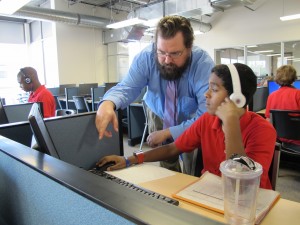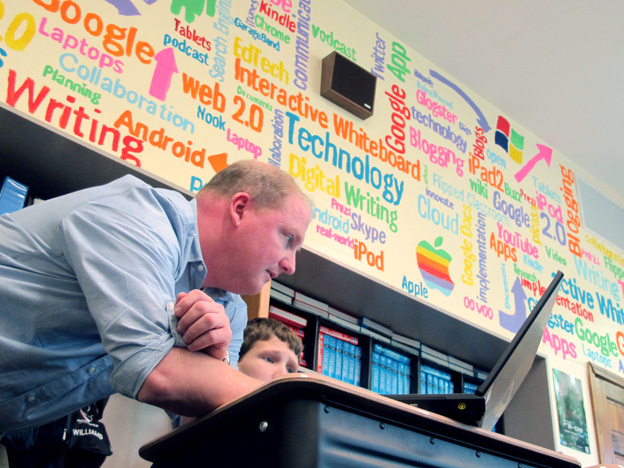Blended Learning Is Expanding In Indiana, But Not Everyone Is Convinced It Works

Kyle Stokes / StateImpact Indiana
Several Carpe Diem teachers pace the 'learning center' while students — who rotate in and out of the space in 35-minute intervals — complete online assignments. Students who need help or who have a question raise their hand to call over a teacher.
Typically, writes Scott Elliott for the Indianapolis Star, it takes charter schools a few years to post strong gains on state tests.
But at Indianapolis’ Carpe Diem, 73 percent of students passed the ISTEP+ in the school’s first year — just a half-point off of the state’s average. We wrote last year when the school opened that the charter’s blended learning approach has attracted advanced students who want to learn at their own pace. But, Elliott notes, there are skeptics:
What companies do with that extra money depends on the school. Another blended learning charter network, Rocketship Education, uses it to pay teachers more. The company plans to open an Indianapolis school next fall.Critics of blended learning, however, lump this concept in with other online schools and say they have concerns about the quality of the learning experience and the true motivations of the purveyors of electronic instruction. Some wonder if they care more about learning or profits.
After all, it can be far cheaper to teach a student with a computer in a cubicle than with an actual person standing in front of the classroom. That, in turn, can free up dollars that can be paid out in profit that can go to school operators and the testing companies that make several of the hot-selling software programs they buy.
Many of the schools that offer online instruction are run by for-profit companies, including those that manage Carpe Diem and Nexus.
Last year, the consulting firm The Parthenon Group did a study that aimed to estimate the cost of blended learning instruction compared to a traditional classroom model. It found the difference could be as much $2,400 per student below what traditional public schools spend on instruction. That’s almost 25 percent less than what the typical traditional public school spends, the study said.
The Indiana Charter School Board has approved applications from three companies to open more than 20 similar schools over the next decade, and four blended learning charters are now operating in Indianapolis.
“I don’t think families are out there looking particularly for a blended learning model,” Adam Emerson, a school choice advocate at the Thomas B. Fordham Institute, told StateImpact in May, “but they may look at a particular school and like what they see.”
But other parents are making a deliberate decision not to send their kids to the hybrid schools. In Fort Wayne, pushback from concerned parents has delayed the opening of a second Carpe Diem school by at least a year.
